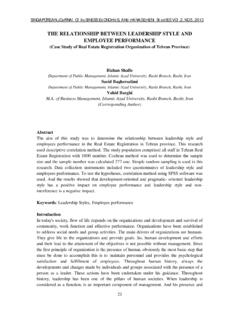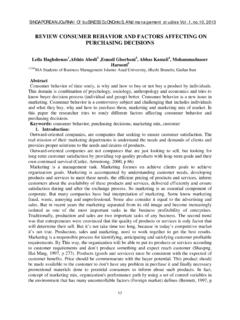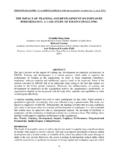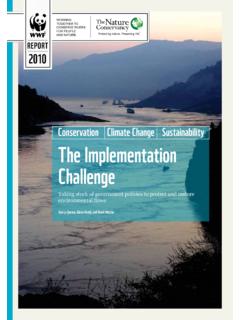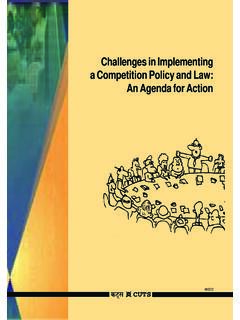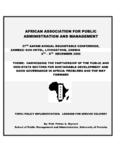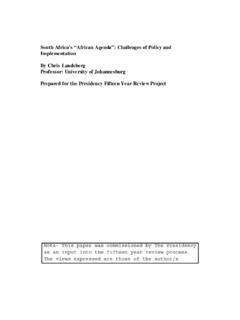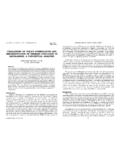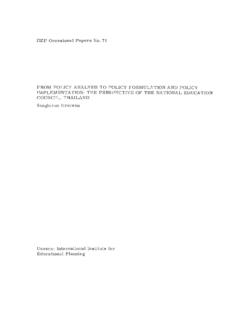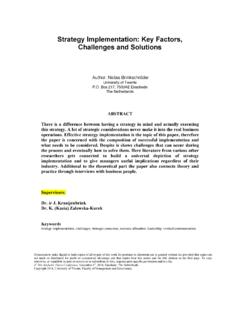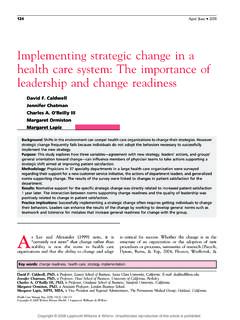Transcription of THE OBSTACLES TO EFFECTIVE POLICY IMPLEMENTATION …
1 SINGAPOREAN JOuRNAl Of buSINESS EcONOmIcS, ANd management studies , , 2013 34 THE OBSTACLES TO EFFECTIVE POLICY IMPLEMENTATION BY THE public bureaucracy IN DEVELOPING NATIONS: THE CASE OF NIGERIA DR. UGWUANYI, BARTHOLOMEW IKECHUKWU INSTITUTE OF MANAGEMENT AND TECHNOLOGY, ENUGU Emma Chukwuemeka, Head, Department of public Administration. Nnamdi Azikiwe University, Awka Nigeria Abstract: The need for enhancing the development process in the developing nations is ever becoming more critical and urgent. The pace at which this can be realized is hinged essentially on the ability of the government to formulate appropriate policies and, very importantly, on the capability of the public bureaucracy to effectively implement the formulated policies.
2 Over the years in Nigeria, numerous brilliant policies have been formulated and implemented. Yet there is no apparent and significant development to show for that as evidenced by the fact that Nigeria has continued to remain in the category of the Least Developed Countries of the world. This suggests that mere formulation of policies should become not the major issue in Nigeria but rather their EFFECTIVE IMPLEMENTATION as it is only effectively implemented policies that can bring about national development. Against this background, the study explored the importance of public POLICY in governance and public administration-generally, deeply discussed public bureaucracy and its role in POLICY IMPLEMENTATION , critically examined and analyzed the key OBSTACLES inhibiting the public bureaucracy in Nigeria from effectively implementing policies.
3 In carrying out the study, the secondary sources of information or data gathering were mostly relied on and consequently, content analysis technique was adopted in the analysis. The basic finding is that there exists, indeed, some factors and circumstances that constitute serious OBSTACLES to EFFECTIVE POLICY IMPLEMENTATION by the public bureaucracy in Nigeria. These factors, among others, include the ineffective and corrupt political leadership under which the public bureaucracy in Nigeria thrives, the pervasive and deep rooted corruption within the public bureaucracy and the pressure and influence of primordial demands and values on the bureaucracy which negatively effect IMPLEMENTATION activities and processes.
4 Recommendations offered to overcome the OBSTACLES and challenges and to reposition the Nigeria public bureaucracy for EFFECTIVE IMPLEMENTATION of policies include, basically, that government should work towards ensuring the evolvement of both purposeful and responsible political and bureaucratic leaderships as well as work towards further realization of politics and administration dichotomy in Nigeria in order to create room for the bureaucracy to operate and implement policies essentially on the basis of laid down ideal bureaucratic rules and principles. The bureaucrats need too to strongly de-emphasize primordial considerations and to resist primordial pressures and demands for special favours in POLICY IMPLEMENTATION activities and processes while government also need to constantly develop appropriate programs for improving the working conditions, and other incentives for the public bureaucrats in order to build their morale and commitment to public service.
5 This, too, could reasonably diminish the propensity among the bureaucrats to misappropriate funds allocated for implementing development policies. Key words: OBSTACLES , POLICY , EFFECTIVE POLICY IMPLEMENTATION , bureaucracy , bureaucrats, development, developing nations. SINGAPOREAN JOuRNAl Of buSINESS EcONOmIcS, ANd management studies , , 2013 35 1. Introduction In every society, there must exist some problems. These problems could be in the areas of politics, commerce, education, agriculture, communication, housing, transportation, health etc. In order to solve these problems as they might exist at given points in time, government is always seen formulating policies in response to them and in relation to the objectives of growth, national development and well being of the citizens.
6 This is necessary because if attempts are not made to address these problems as they arise, they may degenerate into uncontrollable stages with the society s social-economic growth and development endangered.(Okoli and Onah, 2002). For this, the scope and effects of public POLICY is usually very pervasive and dominant particularly in developing nations like Nigeria with a very weak private sector (Ikelegbe 2006, Abah, 2010). For instance, it is the making and IMPLEMENTATION of public policies that determine, for instance, the level of provision of social services, the availability of financial services for economic activities, the level of industrialization, the level of employment opportunities, the level of social or economic inequality, the availability of health facilities, the level of social security, the pace of educational development etc.
7 Fundamentally, a public POLICY is a government action or proposed action directed at achieving certain desired goals or objectives (Ikelegbe, 2006). In the light of a given societal problem, public POLICY guides and determines present and future public decisions as well as private individual or private business institutional actions, decisions or behavior. In essence, a public POLICY determines the activities of government and given private institutions in relation to providing services designed to solve a given problem. Usually, policies are made or formulated by the legislative arm of the government in both the federal, state or local government tiers and implemented by the public bureaucracy or designated private institutions.
8 In most cases, however, it is the public bureaucracy that is saddled with the responsibility of POLICY IMPLEMENTATION . Indeed, in virtually every country of the world, public polices are implemented primarily by the public bureaucracy and specifically by the bureaucrats or career civil servants that work in them (Ezeani, 2006). To this extent, therefore, the role of government in development is, to a very large extent, the role of the public bureaucracy (Abah, 2010). This role the public bureaucracy , plays through the EFFECTIVE IMPLEMENTATION of government policies, projects and programmes aimed at achieving development goals and objectives. Most often in Nigeria, however, policies are well and brilliantly formulated but ineffectively implemented by the bureaucracy (Obodoechi, 2009; Ikelegbe, 2006).
9 This leads to the failure of public policies to achieve their target goals and objectives and to ultimately alleviate the problems for which they were designed. Indeed, there is usually wide gaps between formulated POLICY goals and the achievement of those goals as a result of ineffective IMPLEMENTATION in almost all facets of public administration in Nigeria (Ozor, 2004; Mankinde, 2005). Initially, the emphasis in the literature of POLICY studies was more on the POLICY formulation stage. In contemporary times, however, emphasis has shifted to POLICY IMPLEMENTATION following the realization that EFFECTIVE IMPLEMENTATION of policies is not an automatic affair (Egonmwan, 1984; Ikelegbe, 2006; Nweke, 2006).
10 Again POLICY IMPLEMENTATION has become of greater concern to its formulation particularly in developing nations like Nigeria where the government is increasingly looked upon by the citizens to effectively implement development projects and programmes and where, contrarily, ineffective IMPLEMENTATION of policies has become very critical and worrisome. Against this back ground, and in line with the argument of Ugo and Ukpere (2011) that an adequate solution to the problem of EFFECTIVE POLICY IMPLEMENTATION failures in Nigeria must stem logically from a rigorous examination and analysis of its causes, the study is set to look at POLICY IMPLEMENTATION as a major stage in the POLICY process, to highlight the need and the role of public bureaucracy in EFFECTIVE IMPLEMENTATION of polices, examine SINGAPOREAN JOuRNAl Of buSINESS EcONOmIcS, ANd management studies.
